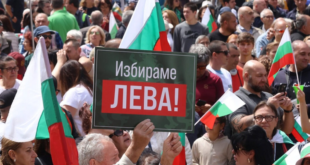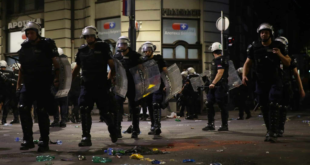 Bulgaria and Romania should try to avoid the decline in democratic progress seen last year in many of the other post-communist countries that are now members of the EU, Freedom House said on Thursday (June 14th) upon the release of a new report.“By drawing attention to the democratic backsliding in the Visegrad countries [the Czech Republic, Hungary, Poland and Slovakia] one hopes that leaders in Bulgaria and Romania may avoid similar pitfalls,” said Jeannette Goehring, managing editor of the US-based think-tank’s annual Nations in Transit study.
Bulgaria and Romania should try to avoid the decline in democratic progress seen last year in many of the other post-communist countries that are now members of the EU, Freedom House said on Thursday (June 14th) upon the release of a new report.“By drawing attention to the democratic backsliding in the Visegrad countries [the Czech Republic, Hungary, Poland and Slovakia] one hopes that leaders in Bulgaria and Romania may avoid similar pitfalls,” said Jeannette Goehring, managing editor of the US-based think-tank’s annual Nations in Transit study.
The report, which analyses political developments in 29 countries and territories from Central Europe to Eurasia from January 1st through December 31st, 2006, found that “populism and anti-liberal trends are on the rise, and judicial independence is coming under increased pressure”. It also warned about an emerging governance crisis in Central Europe due to post-accession reform fatigue and political polarisation.
“Economic progress in Central Europe is increasingly overshadowed by political turmoil,” Roland Kovats, director of Freedom House Europe, said at the report’s presentation Thursday in Budapest. “In too many countries, we are seeing the problem of ruling elites who have focused on concentrating political party power.”
Despite such developments, the ten newest EU nations are still the leaders in democratic progress, according to the study, in which each country is given a democracy score, based on a scale of 1 to 7, with 1 representing the highest level of democratic progress and 7 the lowest. That score represents the average of marks each country is given in eight different categories, including electoral process, civil society, independent media, national democratic governance and corruption.
Nine of the new EU nations have a democracy score of less than 2.99, placing them in the group of “consolidated democracies”. Despite a slight decline in the score it was given in the think-tank’s 2006 report, Slovenia still ranks first with 1.82. It is followed by the other former communist countries that joined the EU in 2004, whose scores are equal to or worse than those received in last year’s report. Bulgaria takes the ninth and last position in that group with 2.89, which is 0.04 better than the mark it was given in 2006.
Despite its 0.10 better score this year, Romania remains in the group of “semi-consolidated democracies”, leading it with 3.29.
Bulgaria’s worst score in the individual categories was for corruption — 3.75. The two standards for which it was given better marks this year are civil society and judicial framework and independence. The only category in which it received a worse score than the one last year is “independent media”. The decline, says Freedom House, is due to “attempts to interfere in media independence and attacks on journalists, combined with the media self-censorship that still exists in all media sectors”.
Romania’s worst scores in the individual categories this year are for corruption (4.00), as well as for independent media and judicial framework and independence (both at 3.75). At the same times, these are the three areas in which the country has made progress since Freedom House’s previous assessment.
Most of the Balkan countries that are hoping to join the EU are in the “semi-consolidated democracies” group as well, with scores of between 3.68 for Serbia and 3.93 for Montenegro. In between are Croatia with 3.75 and Albania and Macedonia, both with 3.82.
Bosnia and Herzegovina’s score of 4.04 gives places it first in the “transitional governments and hybrid regimes” that includes Ukraine, Georgia and Moldova. With a score of 5.36, Kosovo falls in the group of “semi-consolidated authoritarian regimes”.
 Eurasia Press & News
Eurasia Press & News



